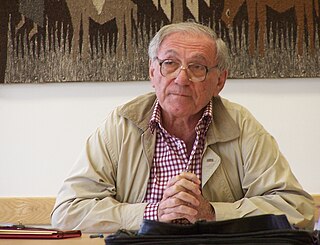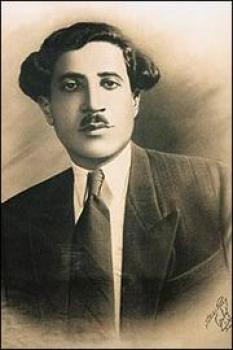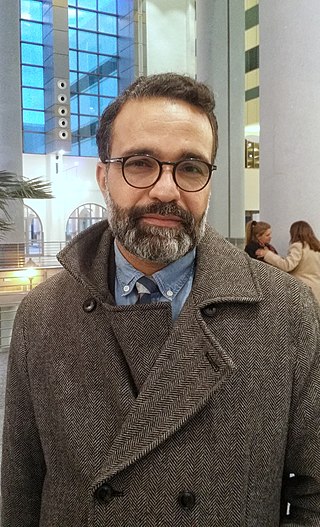Related Research Articles

Ahlam Mosteghanemi is an Algerian poet and writer. She was the first Algerian woman to write poetry and fiction in Arabic. She has published four novels and six anthologies, and is best known for her 1993 novel Memory of the Flesh. In 2007 and 2008, she was ranked #96 and #58 respectively as the most influential Arab by the Arabian Business magazine.
Jamal Mohammed Ibrahim is a Sudanese poet, novelist and former diplomat. He received his B.A. degree with honors in sociology in 1973 from the University of Khartoum. After two years at the Sudanese Ministry of Culture, he worked for the Ministry of Foreign Affairs from 1975 to 2009.

Sadiq Jalal Al-Azm was a Professor Emeritus of Modern European Philosophy at the University of Damascus in Syria and was, until 2007, a visiting professor in the Department of Near Eastern Studies at Princeton University. His main area of specialization was the work of German philosopher Immanuel Kant, but he later placed a greater emphasis upon the Islamic world and its relationship to the West, evidenced by his contribution to the discourse of Orientalism. Al-Azm was also known as a human rights advocate and a champion of intellectual freedom and free speech.
Mai Ghoussoub was a Lebanese writer, artist, publisher and human rights activist. She was the co-founder in London of the Saqi bookshop and publishing house.

Francis bin Fathallah bin Nasrallah Marrash, also known as Francis al-Marrash or Francis Marrash al-Halabi, was a Syrian scholar, publicist, writer and poet of the Nahda or the Arab Renaissance, and a physician. Most of his works revolve around science, history and religion, analysed under an epistemological light. He traveled throughout West Asia and France in his youth, and after some medical training and a year of practice in his native Aleppo, during which he wrote several works, he enrolled in a medical school in Paris; yet, declining health and growing blindness forced him to return to Aleppo, where he produced more literary works until his early death.

Elias Abu Shabaki was a Lebanese writer, poet, editor, translator and literary critic, he was one of the founders of the literary League of Ten and is considered as one of the leading figures of the Arabic Nahda Movement.

The Sheikh Zayed Book Award is a literary award begun in the UAE. It is presented yearly to "Arab writers, intellectuals, publishers as well as young talent whose writings and translations of humanities have scholarly and objectively enriched Arab cultural, literary and social life." The first award was in 2007. The total value of the prizes is DH 7,000,000 making it one of the richest literary awards in the world.

Kamel Riahi or Kamal Riahi, born 1974 in Manafikh, Tunisia), is a Tunisian writer. He teaches in Algeria. Excerpts from two of his novels have been translated into English: The Scalpel and Gorilla. Riahi has been translated into English, French, Italian and Hebrew. He was one of the 39 Arab writers under 40 years who were selected for the anthology Beirut39.
George Tarabishi was a Syrian writer, philosopher, and translator. He translated over 200 books into Arabic, including works by Hegel, Freud, Sartre and Simone de Beauvoir.

Ameen Albert Rihani is a university professor, scholar and administrator. He is a professor of Arab American literature at Notre Dame University - Louiaze. He was the Vice President of Academic Affairs since 1997. In 2013 he became advisor to the President of NDU and the Secretary General of the Institute of Lebanese Thought.
Layla Balabakki was a Lebanese novelist, journalist, activist and feminist. Among her most notable works is Ana Ahya (1958) which tells the story of a woman's protest against parental authority and community leaders. Balabakki's literary work also inspired political uproar because of her public criticisms of Islam and sexually explicit stories. Balabakki was brought to trial, while her work was censored. Her desire to push back against societal values and explore alternative female identities made Balabakki a large influence on contemporary Arab feminism.
Evelyne Accad is a Lebanese-born educator and writer living in the United States, France and Lebanon.
Raif Khoury was a Lebanese writer, poet, essayist, novelist and playwright who was born in Nabay, Lebanon, then part of the Ottoman Empire towards the beginning of the twentieth century. He went to school in the neighboring town of Brummana to Broummana High School, where he started writing poetry at a very early age. He joined the American University of Beirut as an Arabic literature and history major and graduated with a BA in 1932. Even before he graduated, he started writing in literary magazines and papers such as Al Barq, Al Adib and Al Adab which were issued in Beirut at the time. He was a member of the League Against Nazism and Fascism in Syria and Lebanon which was founded in 1939. He founded a magazine entitled Al Tariq with other members of the League in 1941.
Ulayya bint al-Mahdi was an Abbasid princess, noted for her legacy as a poet and musician.
Issam Abdel-Masih Mahfouz was a Lebanese playwright, poet, journalist, author, translator, and critic. His literary works include dozens of books on politics, culture, and theater, as well as “dialogues” - imagined exchanges with historical figures. During his lifetime he was also well known as a Professor of Dramatic Arts at the Lebanese University and for his writing in the Lebanese newspaper al-Nahār, particularly its culture section.
Salah Naoum Al Labaki was a Lebanese poet, scholar, journalist, and lawyer. His poems and writings have received academic attention. Some regard him to be among the poets who introduced "modern Arabic poetry" in the late 20th century. Labaki is considered a pioneer of the renewal movement in Arabic poetry, and more specifically in Lebanese poetry, in the second quarter of the 20th century. Some of his poems were translated into Spanish. He received the academic French medal, The National Order of Cedar in the officer rank, and an honorary degree from The International Institute of California.

Salma Sayegh was a Lebanese writer, novelist, and feminist of the Nahda era. She, along with other female contemporaries, helped in founding the Society for Women's Renaissance. She wrote for several journals, newspapers, and magazines such as Sawt al-Mar’a and published many novels. She also played part in Lebanon's cultural salon movement as she hosted one at her home in Beirut in the early 1950s.
Al Adab was an Arabic avant-garde existentialist literary print magazine published in Beirut, Lebanon, in the period 1953–2012. It was restarted in 2015 as an online-only publication. Encyclopædia Britannica describes it as one of the leading publications founded in the Arab countries in the latter half of the 20th century. Although the magazine was headquartered in Beirut, it was distributed all over the Arabic-speaking regions.

Tafsir Ibnu Abbas, also known as Tafsir Ibn Abbas al-Musama Sahifat Ali ibn Abi Talha an-Ibn Abbas is a book of Tafsir; containing the topics of exegesis and interpretation of the Qur'an. The book is narrated and written by Ali ibn Abi Talha, all of which was done on the authority of Ibn Abbas himself. The book has been translated into Indonesian as well.
Al-Ḥuṭayʾah full name Jarwal ibn 'Aws al-Absi, was an Arab poet of pre-Islamic Arabia, who later converted to Islam. He was known for his extravagant satire and contributions to Arabic poetry. Aside from satire, Al-Hutay'ah also wrote poems with romance, praise, pride and freedom as themes; all of which have been published in the modern era.
References
- ↑ "Arabic Hour". Archived from the original on 13 June 2003. Retrieved 28 June 2011.
- ↑ "Nazek Saba Yared | Who is She in Lebanon".